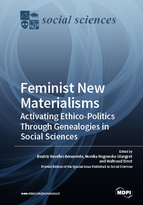Feminist new materialisms: Activating ethico-politics through genealogies in social sciences
A special issue of Social Sciences (ISSN 2076-0760). This special issue belongs to the section "Gender Studies".
Deadline for manuscript submissions: closed (18 March 2019) | Viewed by 46012
Special Issue Editors
Interests: new feminist materialisms
Interests: gender studies
Special Issue Information
Dear Colleagues,
New materialisms refer to a specific ethico-political and onto-epistemological turn that is deeply committed to de-centralizing knowledge production, cutting across pre-established dichotomies, and focusing on processes transversing hierarchies of power relations that organize diverse forms of life. In particular, it is a methodology of situating material-discursive practices that form specific socio-cultural phenomena via a relational ontology in which different elements come to being through intra-actions and agency materializes and redefines itself as a more than isolated human agency. New materialist approaches to the creation and dissemination of scientific knowledge are proliferating across diverse disciplines such as arts (e.g. Kontturi, Tiainen, Nauha & Angerer, 2018; Barrett, Bolt & Kontturi, 2017; Barrett & Bolt, 2013), science and technology (e.g. Ernst, Bath & Vehviläinen, 2017), contemporary philosophy (e.g. Cielemęcka & Rogowska-Stangret, 2018; Bülhman, Colman & van der Tuin, 2017; Revelles-Benavente, González & Nardini, 2014; Dolphijn & van der Tuin, 2012; Coole & Frost 2010), cultural and media studies (e.g. Tianen, Kontturi & Hongisto, 2015), and social sciences (e.g. Allhutter, Bargetz, Meißner, and Thiele, forthcoming; Juelskjær, Plauborg, and Adrian, forthcoming; Revelles-Benavente & González Ramos, forthcoming; Bath, Meißner, Trinkaus, and Völker, 2017; Volk, Löw, Leicht, and Meisterhans, 2017; Fox & Allred, 2017; Alaimo & Hekman, 2010). Although in the mentioned publications the ethico-political frames are strongly present, this is not the case for how new materialisms are recognized and represented in the academia in general. Often, the more recognition new materialisms get in academia, the less space and time is devoted to their ethico-political frames. As a result, the feminist, queer, postcolonial, and ecological stakes are given less attention and importance; the ethico-political frames of feminist new materialisms are amputated from the onto-epistemological turn. In the forthcoming issue of “Social Sciences”, the editors are committed to stressing the importance of ethico-political frames to feminist new materialisms.
According to Dolphijn & van der Tuin (2012), new materialisms are about putting it to work, which means that it is not meant to be described, but performed. The editors of this issue would like to add yet another loop that has to do with situating new materialisms as ethico-politics. We would like to put new materialisms to work for feminist, queer, postcolonial, ecological practices, since we want to invite one to understand feminism with new materialisms and vice-versa. Our approach to this field of research is strongly marked by the concepts of genealogies (van der Tuin, 2015), feminicity (Colman, 2014), diffracting diffraction (Barad, 2014), and the processes of becoming and sense-making of our own flexible and multiple identities (Braidotti 2013). That is, our approach has to do with how we build, contemporaneously, our epistemological genealogies affectively to produce points of activitation for feminist, queer, postcolonial, and ecological practices. We invite one to investigate examples for new social bondings and community building beyond identity politics, and we look for contributions dealing with specific instances of realities that engage with the world with an entanglement between feminist ethics, politics, and methodologies.
Possible areas of focus might include:
- How are feminist new materialisms put to work?
- How are feminist new materialist methodologies dis/activating ethico-politics?
- How are queer, postcolonial, or ecological practices dis/entangled within feminist new materialisms and vice versa?
- What kind of methodologies approach socio-cultural phenomena that deal with social injustices from a new materialist perspective?
- How is situatedness of knowledge production and feminist, queer, postcolonial, or ecological practices un/implied within feminist new materialisms?
- Are new materialisms (re)creating scientific canons and hegemonic knowledges? How?
- How feminist new materialisms face its whiteness, its ghosts, its omissions, and blind spots?
- In which way do new social bondings and community building provide examples for material entanglements within a new onto-ethico-epistemology?
- If processes of becoming take place on a local as well as global level, how is this situatedness linked to the idea of performativity of scientific knowledge production?
Important deadlines:
- Extended abstracts ( 500-word abstract with bibliography and 100-word biography): 15th of November, 2018
- Notification of acceptance: 17th of December, 2018
- Receiving full papers: 18th of March, 2019
Dr. Beatriz Revelles
Dr. Waltraud Ernst
Dr. Monika Rogowska-Stangret
Guest Editors
Manuscript Submission Information
Manuscripts should be submitted online at www.mdpi.com by registering and logging in to this website. Once you are registered, click here to go to the submission form. Manuscripts can be submitted until the deadline. All submissions that pass pre-check are peer-reviewed. Accepted papers will be published continuously in the journal (as soon as accepted) and will be listed together on the special issue website. Research articles, review articles as well as short communications are invited. For planned papers, a title and short abstract (about 100 words) can be sent to the Editorial Office for announcement on this website.
Submitted manuscripts should not have been published previously, nor be under consideration for publication elsewhere (except conference proceedings papers). All manuscripts are thoroughly refereed through a double-blind peer-review process. A guide for authors and other relevant information for submission of manuscripts is available on the Instructions for Authors page. Social Sciences is an international peer-reviewed open access monthly journal published by MDPI.
Please visit the Instructions for Authors page before submitting a manuscript. The Article Processing Charge (APC) for publication in this open access journal is 1800 CHF (Swiss Francs). Submitted papers should be well formatted and use good English. Authors may use MDPI's English editing service prior to publication or during author revisions.
Keywords
- New Materialisms
- Feminism
- ethico-politics






